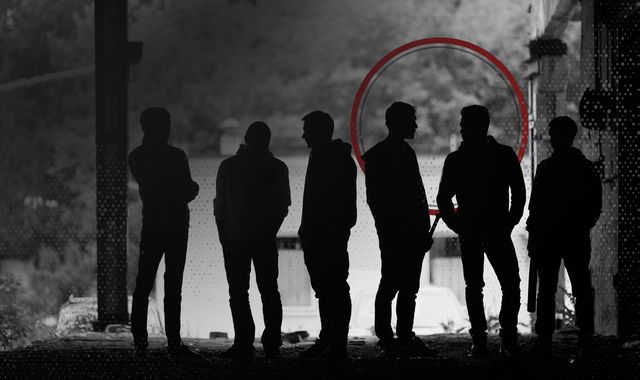Ben was missing for six weeks. His abusive father didn’t ask where he had been
Written by News on 20/06/2020
I’ve never interviewed anyone like Ben before.


A 14-year-old boy with a story of neglect, gang life and a system that seems to have lost him. The day before we met, he’d been picked up by police and returned home to an abusive father.
Having been missing for six weeks, his father didn’t even bother to ask where he’d been.
The next day, he ran away again.
“He didn’t ask where you’d been?” – I kept repeating to Ben, while trying to imagine how I’d feel if my 14-year-old daughter had vanished for six weeks.
“No,” he replied.
That’s when he told me his story.
He’s just a kid, but to me this tale is more important than the transcript from any politician or celebrity I’ve interviewed.
Because wrapped up within it are the real concerns of youth knife crime, the pressures of lockdown, the issues raised about school closure, as well as the very crux of the Black Lives Matter movement – and many of the problems we are storing up for the future.
Ben is black. His mother and father had split up six years earlier.
His mother “had problems”, so – aged eight – Ben was put in care outside of London. He says the other children in the home, and even the staff, were sometimes violent. He got stabbed once. He didn’t make friends.
“I was always alone. I felt on my own. It grew on me, I started to like it, being on my own,” he said.
Then after three years he was returned to his father, who had a new girlfriend and a new baby.
“They thought my dad could take care of me – they thought it was the right move,” he told me.
“At first it was okay, but then abuse happened – I used to get hit by my dad. I thought it was a normal thing, because of all the violence I experienced in the past.
“But I used to go to school, and I was always angry and always misbehaving. I wasn’t myself.”
At this stage, Ben got involved in a gang.
His school in south London was in a different area to the one in which he lived, so he was considered an outsider and when he got on the wrong side of a gang member, he sought to join a gang himself.
Ben tells me: “I grew up in an area. I’ve seen all my friends, I’ve seen a couple of people die, I’ve known a couple who have died, you know, to gunshots…. being stabbed.
“You know to me that’s just a normal day in the neighbourhood.”
We have agreed not to name the gang Ben joined, but I had heard the name before – and it is one heavily associated with violence. In recent years, members have been murdered and gone to prison for murder.
“I felt safe, like they couldn’t touch me,” says Ben.
“But then in the end I realised anyone can be touched, you can get hurt whoever you are.”
Gang life began to change him. He started to carry a knife.
“You are scared that you might get stabbed or shot or even die,” he added.
“Every single time you step outside your house there’s a chance you are going to die on that day, and you don’t know.
“So, it’s worrying – but at the same time there is a thrill to it. If you do a shooting or a stabbing – people know you, that you are not to be messed with.
“People want that respect and the only way you will get that is respect by doing dirt on the road.”
Ben admits that he has stabbed people and says he wouldn’t be alive if he hadn’t.
He didn’t carry a gun, but he travelled in cars with gang members who carried firearms, and he describes quite casually the violence they would administer if they spotted a rival on the street.
“You can jump out on them and shoot or stab them and just hop back in the car,” he says.
“And then just make sure your name ain’t tagged to the car.”
At this point I remind him that he’s only 14. I ask: “Do you ever not just think – I’m a kid I’m too young for all of this?”
“Well – not anymore,” says Ben. “I had to grow up fast because I was alone.”
Ben’s home life was deteriorating during this time.
The physical abuse stopped, but what hurt more was the mental and verbal abuse. His father and partner would often insult him – referencing his mother’s mental illness.
Then under lockdown, the pressure of being cooped up and a ramping up of the verbal abuse caused Ben to run away from home.
To begin with he just ran away for a day, but then disappeared for longer and longer periods.
In answer to the question his father didn’t ask – he was staying with a man who’d recently come out of prison. But Ben insists he felt safer with that person than at home.
Also, during this time it appears Ben had some contact by phone with a social worker, but that person did not know where Ben was and they didn’t meet face to face.
“They just think as long as I’m alive they’re doing their job,” he tells me.
The school was also out of contact with Ben. One teacher had been speaking to Ben’s father – but the school had no idea that he had gone off the radar.
This is the worry about lockdown – children are going missing for longer.
James Simmonds-Read from The Children’s Society told me: “I work closely, as do my colleagues, with police officers, with safeguarding and exploitation leads in social care around the country.
“And we work closely with grassroots and larger charities and we are receiving numerous reports of children going missing for longer – the high-risk children have become even higher risk during COVID.”
Emily Konstantas from the Safeguarding Alliance says there is evidence that a whole new cohort of children are falling into this situation.
She told Sky News: “Children are becoming invisible, they’re falling off the statutory radar, not being known to schools and social services.
“Our biggest concern is around a new frontier of vulnerabilities – these are the children that may not be known to social services. These are children who may be experiencing poverty for the first time, a mental health crisis for the first time or other safeguarding issues.”
Nevres Kemal, who is aware of Ben’s case, runs the north London charity Raising My Voice Foundation.
“We have got social workers, we do have police,” she said.
“People are out there. He’s passed through them, they’ve met him. They’ve spoken to him and what have they done?
“They’ve passed the responsibility on to the father, who is abusive. And he’s been abandoned, so what do you do?
“You go find a family on the street, which is gangs – drug dealing, knife crime, gun crime. Then we wonder as a society how we let a generation fall.”
As I mentioned at the beginning, the day before the interview, Ben told me how he was picked up by the police.
He didn’t explain why. They took him back to his father.
Ben said: “They were just like – this is the best place for me to be – which really annoyed me because they didn’t know the full story. They just met me – they didn’t really know. But they knew I’d run away from home.”
“What did your dad say?” I ask.
Ben replies: “My dad didn’t really say anything – he just said all right. He wasn’t really bothered to be honest.”
“He wasn’t bothered?”
“No.”
“Was he interested in where you’d been?”
“Well, he didn’t ask where I’d been.”
“He didn’t ask?”
“No”
“You’d been away six weeks and he didn’t ask where you’d been?”
“He didn’t ask, no.”
And this is where I start thinking about my own daughter, the same age as this boy. She wouldn’t have the first clue about the street life he was living. I asked him if he could imagine swapping places with someone like that.
“I feel like I am where I am,” he replies.
“There is a reason why, you know, I’m leading this life. I know that at the end of the day people just say gang life, ends up leaving you dead or in prison.
“Sometimes yeah it does – but other times it gives you a good result, through music and other things.
“People get involved in this gang life because they know what they are doing. You might have done a couple of stabbings, yeah, and then stop. And then think about… Let’s think about how to use this gang affiliation to turn my life into something I actually want – money.
“You know – providing for my family. That’s what certain people use this gang life for. It’s not all about just seeing the opposition and trying to kill them. That’s not what all gang members think about.”
“But you are 14?”, I say.
“Yeah, I know.”
On the day of my interview with Ben, a serious case review in Waltham Forest found officials failed to capitalise on a “reachable moment” with Jaden Moodie, who was murdered as a result of gang violence in January 2019.
The 14-year-old was arrested three months before his death, more than 100 miles from his home, in possession of 39 wraps of crack cocaine.
He was clearly being exploited by a county lines drug gang, but it seems authorities didn’t reach out at this point, perhaps not identifying his vulnerability.
Maybe Jaden Moodie didn’t see himself as vulnerable? I ask Ben: “Do you see yourself as a vulnerable child?”
“No, I don’t,” he says.
“How do you see yourself?”
“As a 14-year-old kid that had to grow up fast.”
When I’ve been among Black Lives Matter protesters, no one said anything to me that was more impactful for my understanding of the movement than what Ben just told me.
Isn’t this the nub of it?
What chance has Ben got of making something of his life? Why are 80% of London’s gang members black?
The answer? Circumstances.
Sky News was alerted to Ben’s plight by a local charity, who agreed we could talk to him. He is now being looked after by the charity and since the interview has been engaging with social services.
:: Listen to the New Lines podcast on Apple Podcasts, Google Podcasts, Spotify, Spreaker
(c) Sky News 2020: Ben was missing for six weeks. His abusive father didn’t ask where he had been





